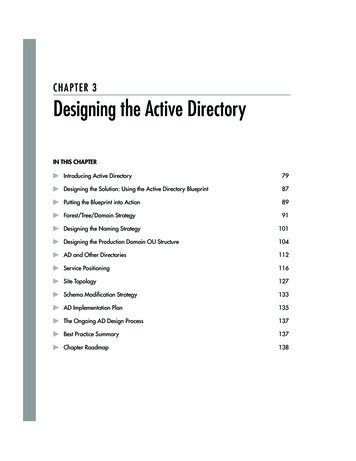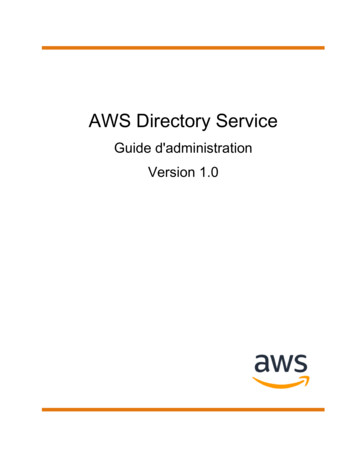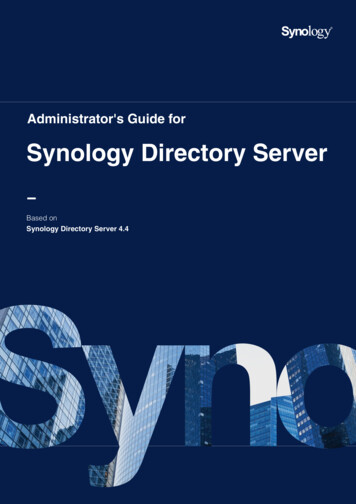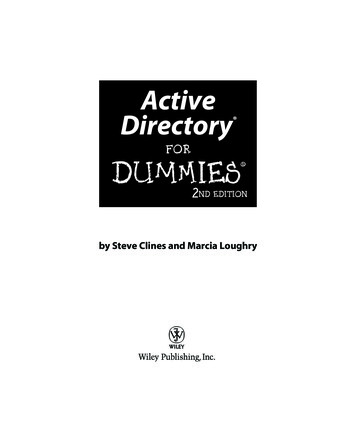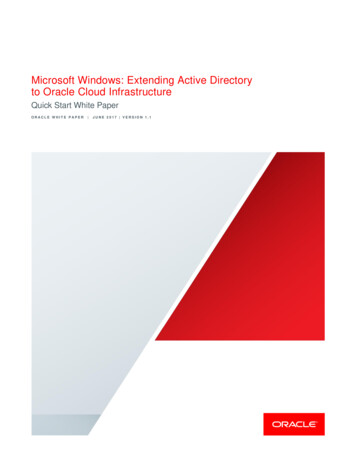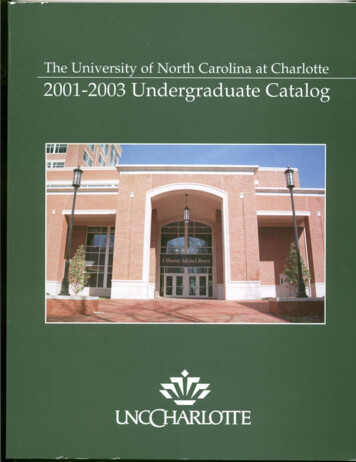
Transcription
Correspondence DirectoryIf, after reading this Catalog, you have further questionsor specific inquiries about the programs of, or admission to,The University of North Carolina at Charlotte, please lookbelow to find the proper office to contact. Addresscorrespondence to any of the offices in care of:The University of North Carolina at Charlotte9201 University City BoulevardCharlotte, North Carolina 28223-0001INFORMATIONCampus Operator . 704-687-2000Academic Affairs . 704-687-2224AdmissionsUndergraduate . 704-687-2213Graduate . 704-687-3366International . 704-687-2694Brocker Health Center . 704-687-4617College ofArchitecture . 704-687-2358Arts and Sciences . 704-687-4303Business Administration . 704-687-2165Education . 704-687-4707Engineering . 704-687-2301Information Technology . 704-687-3119Nursing and Health Professions . 704-687-4650Cone University Center . 704-687-2267Continuing Education and Extension . 704-687-2424Counseling Center. 704-687-2105Dean of Students . 704-687-2375Financial Aid . 704-687-2461Graduate School. 704-687-3371International Programs . 704-687-2442J. Murrey Atkins LibraryCirculation . 704-687-2392Reference. 704-687-2241Records/Registration . 704-687-3487Residence Life . 704-687-2585Student Affairs . 704-687-2206Summer Programs . 704-687-2424 or 4481EMERGENCY NUMBERSCampus Police -- Emergency . 911 (on campus) 704-687-2200 (off campus)Director of Public Safety and Non-EmergencyCalls . 704-687-2282Health Services (radio contact w/police) 704-687-4617About This Catalog.Although the publisher of this catalog has made everyreasonable effort to attain factual accuracy herein, noresponsibility is assumed for editorial, clerical or printingerrors, or errors occasioned by mistakes. The publisher hasattempted to present information that, at the time ofpreparation for printing, most accurately describes thecourse offerings, faculty listings, policies, procedures,regulations and requirements of the University. However, itdoes not establish contractual relations. The Universityreserves the right to alter or change any statement containedherein without prior notice.Graduation Rate Disclosure Statement. Our data show that 54% ofthe full-time new freshmen who entered UNC Charlotte in Fall 1994 havereceived a baccalaureate from this institution or another UNC institution asof Fall 2000. In addition, another 6% were enrolled at this or another UNCinstitution in pursuit of their baccalaureate degree as of Fall 2000. Thisinformation is provided pursuant to requirements of the Student-Right-toKnow and Campus Security Act of 1990.Published by the Office of Academic Affairs, 4/01.35,000 copies of this public document were printed at acost of 48,486 or 1.39 per copy.
The University ofNorth Carolina at CharlotteUndergraduate Catalog2001-2003Vol. XXVIII, No. IAvailable electronically at http://www.uncc.edu/catalog/The University of North Carolina at Charlotte is open to people of all races, committed to equalityof educational opportunity, and does not discriminate against applicants, students, or employeesbased on race, color, national origin, religion, sex, sexual orientation, age, or disability.Moreover, UNC Charlotte actively seeks to promote integration by recruiting and enrolling alarger number of African-American, Native-American, and other ethnically diverse students.
Academic Calendar 2001-2003Dates pertaining to changes in enrollment and refunds are included in the calendars that appear in the Schedule of Classes each semesterand in the summer sessions bulletin.FALL SEMESTER, 2001Academic year begins . Tuesday, August 14Orientation, Advising, Registration .Wednesday-Friday, August 15-17First class day . Monday, August 20Labor Day (no classes)(University closed) . Monday, September 3Student recess (no classes) . Friday, October 12Thanksgiving recess (no classes) . Wednesday-Friday, November 21-23Last class day . Friday, December 7Final examinations .Saturday, December 8, Monday-Friday, December 10-14Commencement .Saturday, December 15SPRING SEMESTER, 2002Orientation, Advising, Registration . Sunday-Tuesday, January 6-8First class day . Wednesday, January 9Martin Luther King Day (no classes)(University closed) . Monday, January 21Spring recess (no classes) . Monday-Friday, March 4-8Last class day . Wednesday, May 1Final examinations . Thursday-Saturday, May 2-4, Monday-Wednesday, May 6-8Commencement . Saturday, May 11Academic year ends . Monday, May 13FIRST SUMMER TERM, 2002Registration . Tuesday, May 22First class day . Wednesday, May 23Last class day . Wednesday, June 26Final examinations . Thursday-Friday, June 27-28SECOND SUMMER TERM, 2002Registration . Friday, June 28First class day . Monday, July 1Fourth of July (no classes)(University closed). Thursday-Friday, July 4-5Last class day . Tuesday, August 6Final examinations . Wednesday-Thursday, August 7-8FALL SEMESTER, 2002Academic year begins . Wednesday, August 14Orientation, Advising, Registration .Wednesday-Friday, August 14-16First class day . Monday, August 19Labor Day (no classes)(University closed) . Monday, September 2Fall recess (no classes) . Friday, October 11Thanksgiving recess (no classes) . Wednesday-Friday, November 27-29Last class day . Friday, December 6Final examinations .Saturday, December 7, Monday-Friday, December 9-13Commencement .Saturday, December 14SPRING SEMESTER, 2003Orientation, Advising, Registration . Wednesday-Friday, January 8-10First class day . Monday, January 13Martin Luther King Day (no classes)(University closed) . Monday, January 20Spring recess (no classes) . Monday-Friday, March 10-14Last class day . Monday, May 5Final examinations . Tuesday-Saturday, May 6-10, Monday, May 12Commencement . Sunday, May 11Academic year ends . Tuesday, May 13FIRST SUMMER TERM, 2003Registration . Tuesday, May 27First class day . Wednesday, May 28Last class day . Tuesday, July 1Final examinations . Wednesday-Thursday, July 2-3SECOND SUMMER TERM, 2003Registration . Thursday, July 3Fourth of July (no classes)(University closed). Friday, July 4First class day . Monday, July 7Last class day . Friday, August 8Final examinations . Monday-Tuesday, August 11-12
Table of ContentsAcademic Calendar. 2Economics . 99The University . 4Finance and Business Law . 102Student Life--Activities, Organizations . 8Management. 103Admission to the University . 13Marketing . 105Financial Information. 18College of Education . 107Academic Regulations and Degree Requirements. 26Counseling, Special Education,and Child Development . 107Programs and Degrees Offered . 41Undergraduate ProgramsEducational Administration, Research,and Technology . 107College of Architecture . 47Middle, Secondary, and K-12 Education . 107College of Arts and Sciences . 51Reading and Elementary Education . 107African-American and African Studies . 52College of Engineering, William States Lee . 117American Studies . 53Civil Engineering . 119Art . 53Electrical and Computer Engineering . 121Biology . 56Engineering Technology . 124Chemistry . 59Mechanical Engineering and Engineering Science . 130Communication Studies . 64College of Information Technology . 134Criminal Justice . 67Computer Science . 135Dance and Theatre. 68Software and Information Systems . 137English . 69College of Nursing & Health Professions . 139Film Studies . 70Nursing . 139Geography and Earth Sciences . 71Health Promotion and Kinesiology. . 142Gerontology . 74Special Programs . 144History. 75University Honors . 144International Studies. 76Departmental Honors Program . 144Judaic Studies . 79International Studies . 144Languages & Culture Studies . 79ROTC Programs. 145Mathematics . 81Experiential Learning Programs . 147Museum Studies . 82Preparation for Professional Schools . 148Music. 82Course Descriptions (AAAS-WMST) . 150Neuroscience Studies . 83Facilities and Services . 266Philosophy. 84Educational Services and Facilities . 266Physics . 85Student Affairs and Services . 270Political Science . 87Psychology . 88OUTREACH: The University andThe Community . 272Religious Studies . 90University Regulation of Student Conduct . 275Social Work . 90Code of Student Academic Integrity . 275Sociology and Anthropology . 91Code of Student Responsibility . 275Urban Studies . 92Program to Prevent Use of Illegal Drugs andAlcohol Abuse . 276Women's Studies . 92College of Business Administration, Belk . 94Accounting . 95Business Info. Systems and Operations Mgmt. . 97Immunization Requirements . 278Directory. 280Index . 315
4The UniversityTHE UNIVERSITYHISTORY OF THE UNIVERSITY OF NORTHCAROLINAIn North Carolina, all public educational institutionsthat grant baccalaureate degrees are part of the Universityof North Carolina. The University of North Carolina atCharlotte is one of the 16 constituent institutions of themulti-campus state university.The University of North Carolina, chartered by the N.C.General Assembly in 1789, was the first public Universityin the United States to open its doors and the only one tograduate students in the eighteenth century. The first classwas admitted in Chapel Hill in 1795. For the next 136years, the only campus of the University of North Carolinawas at Chapel Hill.In 1877, the N.C. General Assembly began sponsoringadditional institutions of higher education, diverse in originand purpose. Five were historically black institutions, andanother was founded to educate American Indians. Severalwere created to prepare teachers for the public schools.Others had a technological emphasis. One is a trainingschool for performing artists.In 1931, the N.C. General Assembly redefined theUniversity of North Carolina to include three statesupported institutions: the campus at Chapel Hill (now theUniversity of North Carolina at Chapel Hill), NorthCarolina State College (now North Carolina StateUniversity at Raleigh), and Woman's College (now theUniversity of North Carolina at Greensboro). The newmulti-campus University operated with one board oftrustees and one president. By 1969, three additionalcampuses had joined the University through legislativeaction: the University of North Carolina at Charlotte, theUniversity of North Carolina at Asheville, and theUniversity of North Carolina at Wilmington.In 1971, the General Assembly passed legislationbringing into the University of North Carolina the state'sten remaining public senior institutions, each of which haduntil then been legally separate: Appalachian StateUniversity, East Carolina University, Elizabeth City StateUniversity, Fayetteville State University, North CarolinaAgricultural and Technical State University, NorthCarolina Central University, the North Carolina School ofthe Arts, Pembroke State University (now the University ofNorth Carolina at Pembroke), Western Carolina University,and Winston-Salem State University. This action createdthe current 16-campus University. (In 1985, the NorthCarolina School of Science and Mathematics, a residentialhigh school for gifted students, was declared an affiliatedschool of the University.)The UNC Board of Governors is the policy-makingbody legally charged with "the general determination,control, supervision, management, and governance of allaffairs of the constituent institutions." It elects thepresident, who administers the University. The 32 votingmembers of the Board of Governors are elected by theGeneral Assembly for four-year terms. Former boardchairmen and board members who are former governors ofNorth Carolina may continue to serve for limited periodsas non-voting members emeriti. The president of the UNC
The UniversityAssociation of Student Governments, or that student'sdesignee, is also a non-voting member.Each of the 16 constituent institutions is headed by achancellor, who is chosen by the Board of Governors onthe president's nomination and is responsible to thepresident. Each institution has a board of trustees,consisting of eight members elected by the Board ofGovernors, four appointed by the governor, and thepresident of the student body, who serves ex-officio. (TheNC School of the Arts has two additional ex-officiomembers.) Each board of trustees holds extensive powersover academic and other operations of its institution ondelegation from the Board of Governors.THE UNIVERSITY OF NORTH CAROLINA ATCHARLOTTEUNC Charlotte aspires to be North Carolina's mostenergetic and responsive public University, offeringexcellent educational opportunities at the undergraduateand graduate levels in the liberal arts and sciences andselected professions. The University provides intellectualleadership for addressing the educational, cultural,economic, social and research needs of its local, state andnational constituencies, in an environment distinguished byits nationally renowned faculty. Through their engagementin programs of instruction, scholarship and public service,the University responds to the demands of an increasinglycomplex world and the dynamics of a burgeoningmetropolitan region.The University offers programs leading tobaccalaureate, master's and doctoral degrees as well asprograms leading to professional licensure in architecture,business, education, engineering, health professions, thehumanities, information technology, the physical andbiological sciences, and the social and behavioral sciences.In order to meet the growing need for higher education inthe Charlotte region and in the State, the Universitycontinues to expand its degree programs and its continuingeducation non-degree offerings.The University is committed to excellence throughinformed and effective teaching in all its academicprograms and emphasizes undergraduate instruction as thefoundation of life-long learning and advanced formaleducation. It selects students who have demonstrated awillingness to learn, a capacity to benefit from a broadarray of intellectual resources, and the potential toparticipate in the opportunities offered by the changingglobal society. University programs are open to allqualified students without regard to race, color, nationalorigin, gender, age, religious belief, sexual orientation, ordisability. Participation by students from other states andnations is welcomed.The academic programs of the University are offeredon-campus and off-campus, and through e-learning andcontinuing education. These programs are augmented bystudent support and development activities and through awide variety of collaborative relationships that expand theclassroom into the region.The size and distinction of its research programsreflects its nationally competitive faculty. Recruited fromacross the world, they engage in both basic and applied5research. Their scholarly inquiry informs both graduateand undergraduate instruction, and takes advantage, whenappropriate, of the University's location in a diverse andexpanding metropolitan region.Leadership in public service is provided throughcampus-based programs and consulting and cooperativearrangements with local, regional, national, andinternational organizations. The University strives tomaintain a campus environment that encourages the activeinvolvement of students in their personal and intellectualdevelopment, including opportunities to learn leadershipskills. The University serves its neighboring communitythrough a variety of public events and outreach activitiesinvolving members of the faculty, staff, and student body.The citizens of the region are regularly invited to share inthe broad range of opportunities generated by the campus,including athletics, the performing and visual arts,continuing education opportunities, and many otherspeakers, workshops, and outreach activities.UNC Charlotte was founded in 1946 to serve returningveterans of World War II. Over the course of its history,the student body has expanded to include many diversepopulations. Of late, the age of the undergraduate studentbody is increasingly traditional. This dynamic has led theUniversity to develop a large residential campus. Withinthis growing residential environment, the Universityretains its historic commitment to serving a diverse studentpopulation, including ethnic minorities, part-time students,persons with disabilities, and non-traditional students in awelcoming, positive, and healthful learning environment.As one of the fastest growing universities in the State,UNC Charlotte has established a tradition of carefulplanning and intelligent stewardship to assure the mostefficient use of its facilities and resources. The UNCBoard of Governors has classified the University as aDoctoral/Research-Intensive institution. The Universitywill continue to expand as resources from both public andprivate sources grow.The policies and practices of the University aredesigned to graduate students who: Have a broad knowledge base as well as a morespecialized knowledge base in their chosen area;Possess skills and capacities that can be applied toa variety of situations and professions in an everchanging world;Understand the complexities and interrelationshipsbetween humans and their environment;Possess a realistic understanding of their ownpotentials, limitations and mental/physicaldevelopment; andPossess a general understanding of andappreciation for:¾ Science and technology¾ Literature and the arts¾ The individual, society, and culture¾ The interrelationships among these areas
6The UniversityGoals of UNC Charlotte General EducationIn order to meet the goals of UNC Charlotte's generaleducation, students engage in programs designed todevelop understandings, skills and capacities in thefollowing six interrelated major areas:I.II.III.IV.V.VI.CommunicationProblem SolvingUnderstanding ValuesUnderstanding Science and TechnologyUnderstanding the Arts, Literature and IdeasUnderstanding the Individual, Society andCultureINSTITUTIONAL MISSION STATEMENTUNC Charlotte is the only Doctoral/ResearchUniversity - Intensive in the Charlotte region, fullyengaged in the discovery, dissemination, synthesis, andapplication of knowledge. It provides for the educational,economic, social, and cultural advancement of the peopleof North Carolina through on- and off-campus programs,continuing personal and professional educationopportunities, research, and collaborative relationshipswith private, public, and nonprofit institutions. UNCCharlotte has a special responsibility to build theintellectual capital of this area. As such it serves theresearch and doctoral education needs of the greaterCharlotte metropolitan region.The primary commitment of UNC Charlotte is to extendeducational opportunities and to ensure success forqualified students of diverse backgrounds throughinformed and effective teaching in the liberal arts andsciences and in selected professional programs offeredthrough Colleges of Architecture, Arts and Sciences,Business Administration, Education, Engineering,Information Technology, and Nursing and HealthProfessions, and through programs and services designedto support student's intellectual and personal developme
that grant baccalaureate degrees are part of the University of North Carolina. The University of North Carolina at Charlotte is one of the 16 constituent institutions of the multi-campus state university. The University of North Carolina, chartered by the N.C. General Assembly in 1789, was the first public University
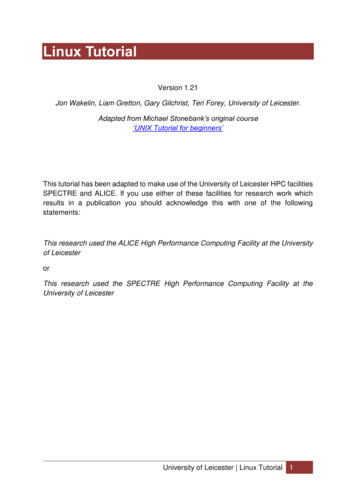

![[MS-ADFSOD]: Active Directory Federation Services (AD FS .](/img/1/5bms-adfsod-5d.jpg)
